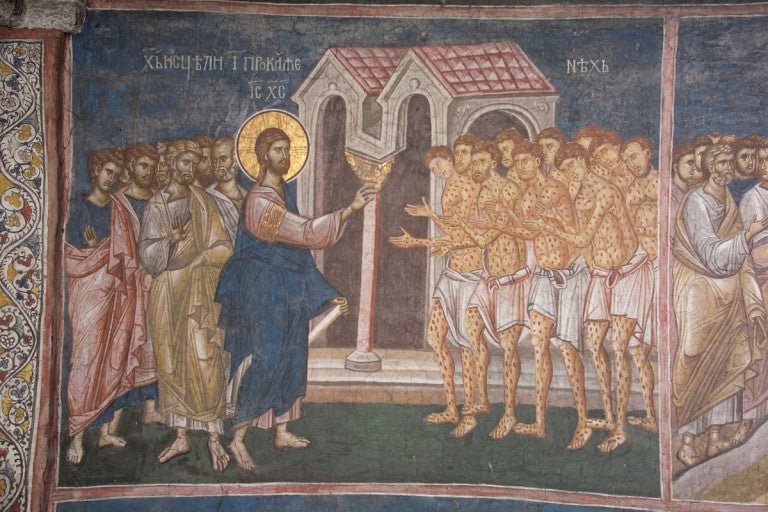Sermon on Gratitude - The Cleansing of the Ten Lepers (29th Sunday after Pentecost, 2015)

Today’s Gospel is, simply put, about gratitude. We can sum up the message of today’s Gospel rather easily: Gratitude is a rare quality, but it is praised by Christ and gratitude for all that we have received from God leads to a deeper relationship with Him and to new and better good things.
Gratitude is a virtue, but it is also a quality, a value we can choose to hold, and it could also be described as a feeling. Let us consider gratitude in a metaphorical way for a moment. Gratitude is like an extremely potent and reactive element found in nature. One drop of this element is enough to affect everything which it comes into contact with. And in the armory of our spiritual life, it is a great secret weapon – a “nuclear” weapon, against a whole host of passions. Gratitude is the slayer of despondency, the softener of a hard heart, the bringer of spiritual perspective, the cleanser of difficult memories, the balm for irrational anger, and the brake on excessive desire. It is also the greatest aid to us when we begin the act of prayer. Elder Joseph the Hesychast, in his letters to a struggling hermit, advised the hermit to begin his prayer vigil with thoughts of gratitude. Elder Joseph advised the monk to begin by looking at the most basic things about his life that he might have begun to take for granted – to thank God that he had the knowledge of the Christian Gospel from his youth, that he had the opportunity to know and live the True Faith, and that he had the opportunity to become a monk and draw near to God through his monastic struggles. From this nightly exercise in gratitude, Elder Joseph said, would come a warming and softening of the heart, after which prayer would become easier.
Every single person in this community walks through the doors of the temple each day with a different burden. One feels that he will never overcome the passions that rule him from morning to night and wound his heart each day, and for this he is despondent. Another feels pressure from his family in the world to do or be something different – and this burden can be quite complex, something filled with layers of shame and judgement and frustration on both sides of the argument. Another has just had a conflict with one of his brothers, or even with his spiritual father, and maybe even a whole string of conflicts, and grieving, is unsure if he will be able to humble himself. Another is overwhelmed by physical weakness, old age and sickness, wonders how he can continue to push himself, and becomes despondent. Another feels his mind is not stable, and grieves over his inability to control his thoughts and actions. Yet another completely resents his lot in life from the time he was born, and can’t understand how God could allow the suffering and disorder he has experienced all these years. Yet another just feels overworked, and his obediences have become a seemingly intolerable burden for him. We all come with something different, and sometimes each of us comes with a different burden every day, depending on the circumstances. What options do we have? We could seek for someone else to blame. This might make us feel a little better temporarily, but it doesn’t really resolve anything, and this is a destructive choice. We could choose a deepening despondency, to the point where once we have reached the bottom we cannot move ourselves from the bed or the chair and cannot make even one sincere prayer rise up from the depths of our heart. We are free to choose these destructive behaviors – God will not stop us, just as he did not stop the nine lepers from walking away without showing gratitude. But there is another way, the way of gratitude, and we can even choose this way of gratitude in every single situation we encounter, 24 hours a day. If we believe completely in God’s Providence, and if our goal is to be in total communion with God and vigilant with ourselves 24 hours a day, then every time we encounter a challenge – a disruptive thought, a potential conflict, physical weakness, or a seductive temptation, we can stop, and see that God is showing us what we really have inside us through the strong impulse we feel to fall to this challenge or temptation. Isn’t it a gift to see what we really are? We can thank God for it, saying to Him: “Thank you that through this challenge or temptation you have shown me where I am and who I am. Forgive me. Thank you. I love you.” After this we can begin to pray fervently and sincerely, and the prayer is sweetened by these humble statements so filled with childlike gratitude. It is quite possible that after this we can forget completely what the temptation or challenge even was to begin with. The point is that if we have a constant feeling of gratitude toward God, then every single thing we encounter is a gift from him (even if it comes in a dirty, ugly box) which has the potential to deepen our communion with Him and our understanding of ourselves and our real state. And when we look back at our lives and all the temptations and challenges, joys and sorrows, darkness and light which we have encountered, can we really come to a point where we thank God for everything? We absolutely must come to this point if we really want to have a deep sense of gratitude for God’s Providence in our lives. This gratitude will open the doors of our heart to love, joy, peace, humility, and every good thing in Christ Jesus our Lord. Amen.




Leave a comment